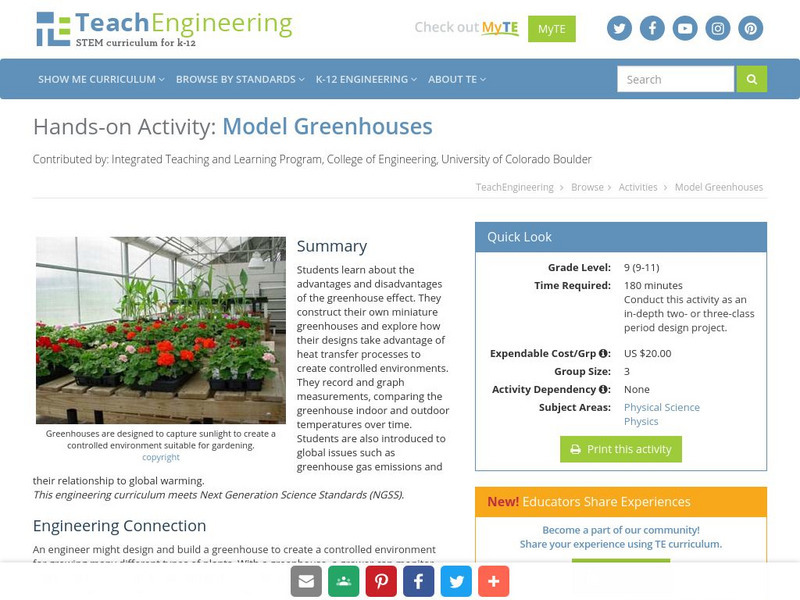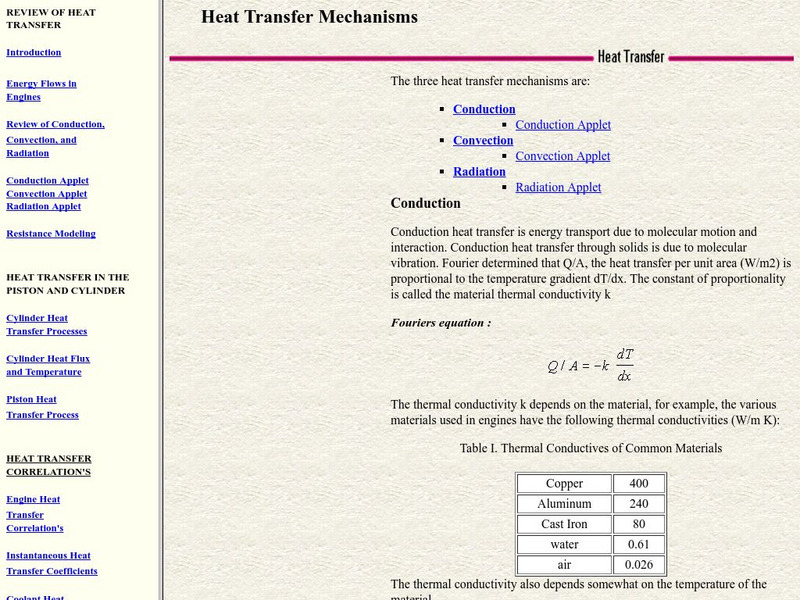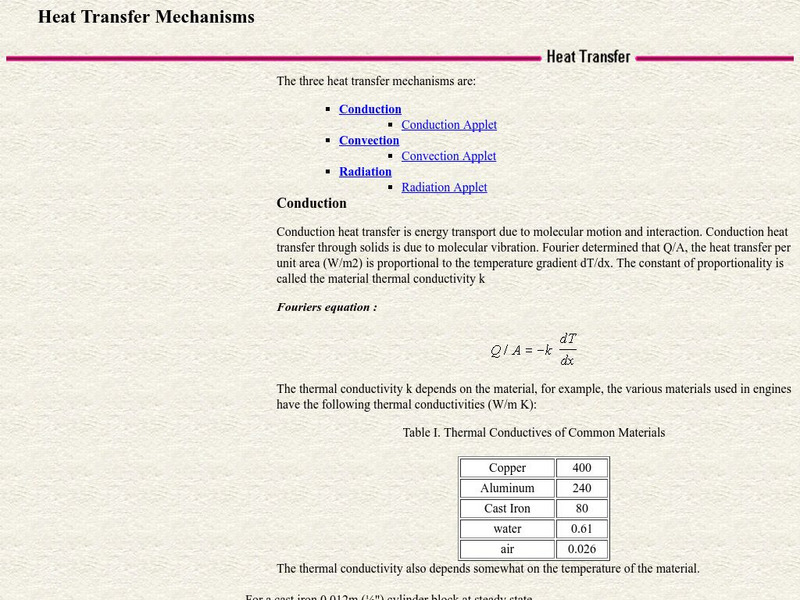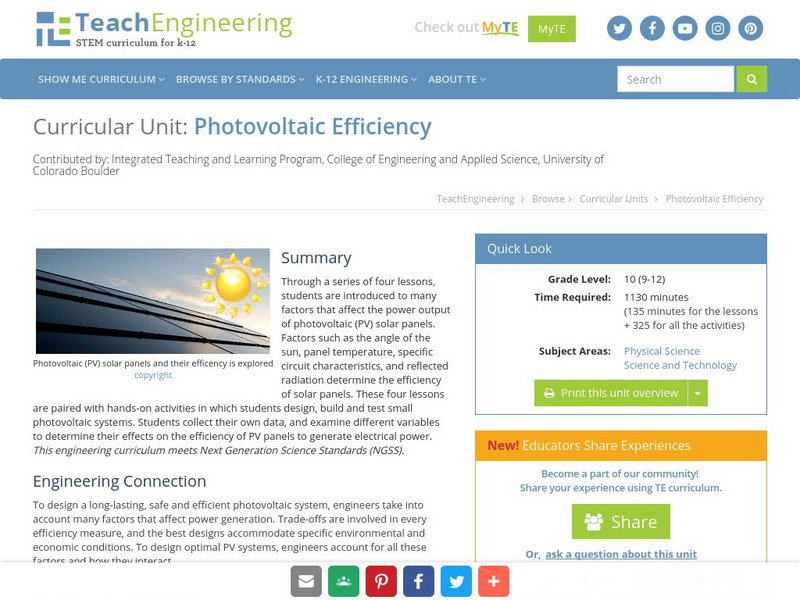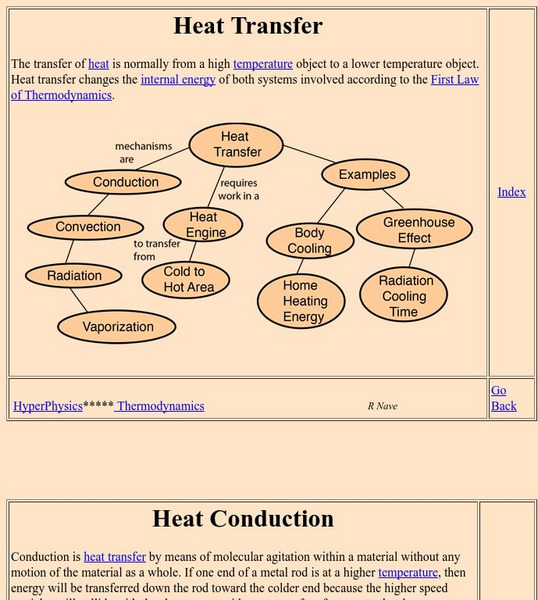Hi, what do you want to do?
TeachEngineering
Teach Engineering: Heat Transfer: No Magic About It
Heat transfer is an important concept that is a part of everyday life yet often misunderstood by students. In this lesson, students learn the scientific concepts of temperature, heat, and the transfer of heat through conduction,...
Science Buddies
Science Buddies: Project Ideas: How Horses Keep Warm in the Wind
In this mammalian biology science fair project, students will learn about methods of heat transfer and determine the best direction in which horses should stand in a cold wind to maintain their core temperature. The Science Buddies...
TeachEngineering
Teach Engineering: Model Greenhouses
Students learn about the advantages and disadvantages of the greenhouse effect. They construct their own miniature greenhouses and explore how their designs take advantage of heat transfer processes to create controlled environments....
Colorado State University
Colorado State University: Heat Transfer Mechanisms
An excellent page from the Colorado State University with a heavy mathematical emphasis. Each form of heat transfer--conduction, convection, and radiation--is defined, compared and contrasted. Mathematical equations governing the rates...
Colorado State University
Csu: Heat Transfer Mechanisms
An excellent page from the Colorado State University with a heavy mathematical emphasis. Each form of heat transfer--conduction, convection, and radiation--is defined, compared, and contrasted. Mathematical equations governing the rates...
Concord Consortium
Concord Consortium: Stem Resources: Greenhouse Effect in a Greenhouse
A lab where students will construct their own small greenhouse out of a plastic container, plastic wrap, and different materials to observe the effect this has on temperature. Data is collected, graphed, and saved online to be graded by...
Science Struck
Science Struck: Working of an Infrared Thermometer
Learn how an infrared thermometer works and what each of its parts does. A chart lists the different applications of infrared thermometers by the wavelength each emits.
Other
Temperatures: Thermal Imagers
A page which describes thermal imaging and cameras which utilize infrared radiation. The means by which these imaging devices operate is described.
TeachEngineering
Teach Engineering: Photovoltaic Efficiency
Through a series of four lessons, students are introduced to many factors that affect the power output of photovoltaic (PV) solar panels. Factors such as the angle of the sun, temperature of the panels, specific circuit characteristics,...
University Corporation for Atmospheric Research
Ucar: Virtual Ballooning to Explore the Atmosphere Activity
In this computer-based virtual lab, students will learn about the layers of Earth's atmosphere by launching virtual balloons to collect temperature and pressure data at various altitudes. Given a limited number of balloon flights,...
CK-12 Foundation
Ck 12: Heat Transfer
[Free Registration/Login may be required to access all resource tools.] Students explore the relationship between heat and energy transfer, and learn about the three ways that heat can be transferred between objects of different...
Science Buddies
Science Buddies: What's the Fastest Way to Cool a Soda?
When you are craving an ice cold drink of soda, the last thing you want is to be stuck with a bunch of soda cans at room temperature. This fun science experiment sends you on a discovery to find the fastest way to cool soda with...
Georgia State University
Georgia State University: Hyper Physics: Heat Conduction
Using understandable words and exceptional graphics, this page describes the transfer of energy by means of conduction. Contains several links to related topics.
Curated OER
Ucar: About Temperature
This site from the University Corporation of Atmospheric Research provides a lengthy page covering numerous topics including the difference between heat and temperature, the use of different temperature scales, thermal expansion, how a...
Concord Consortium
Concord Consortium: Stem Resources: Greenhouse Gases
Do you understand the relationship between temperature and carbon dioxide in our atmosphere? This computer model shows factors such as clouds and carbon dioxide that could cause global temperatures to rise. Students investigate how the...
Georgia State University
Georgia State University: Hyper Physics: Heat Convection
Using understandable words and exceptional graphics, this page describes the transfer of energy by means of the convection process. Contains several links to related topics.
Other
Newport: Introduction to Solar Radiation
Radiation from the sun sustains life on earth and determines climate. The energy flow within the sun results in a surface temperature of around 5800 K, so the spectrum of the radiation from the sun is similar to that of a 5800 K...
Exploratorium
Exploratorium: Global Climate Change: Atmosphere
Use this site to explore real scientific data relating to the atmosphere. With this information you can gather evidence, test theories, and come to conclusions. Click on the data examples to view a full scale version.
NOAA
Noaa: Cpc: Weekly Enso Update
Weekly updates on data collected and analyzed by the Climate Prediction Center. Includes sea surface temperature, subsurface tropical Pacific analyses and much more. Extensive site: check it out!
Curated OER
Fund. Of Phys. Geography/energy, Temperature, and Heat
A page describing (in part) the distinction between energy, temperature and heat. Includes graphic illustrating the quantity of energy needed to transform water between its various states. Methods of thermal energy transfer (convection,...
ClassFlow
Class Flow: Intro to Climate
[Free Registration/Login Required] Students will learn about the differences between climate and weather. Topics include - Keeling Curve, Average Global Temperature, Electromagnetic Radiation, Energy Balance, Global Equilibrium, and...
ClassFlow
Class Flow: Heat
[Free Registration/Login Required] This flipchart investigates how heat is produced and the effects of heating and cooling and demonstrates how a change in temperature indicates a change in heat. Students will sequence objects according...







